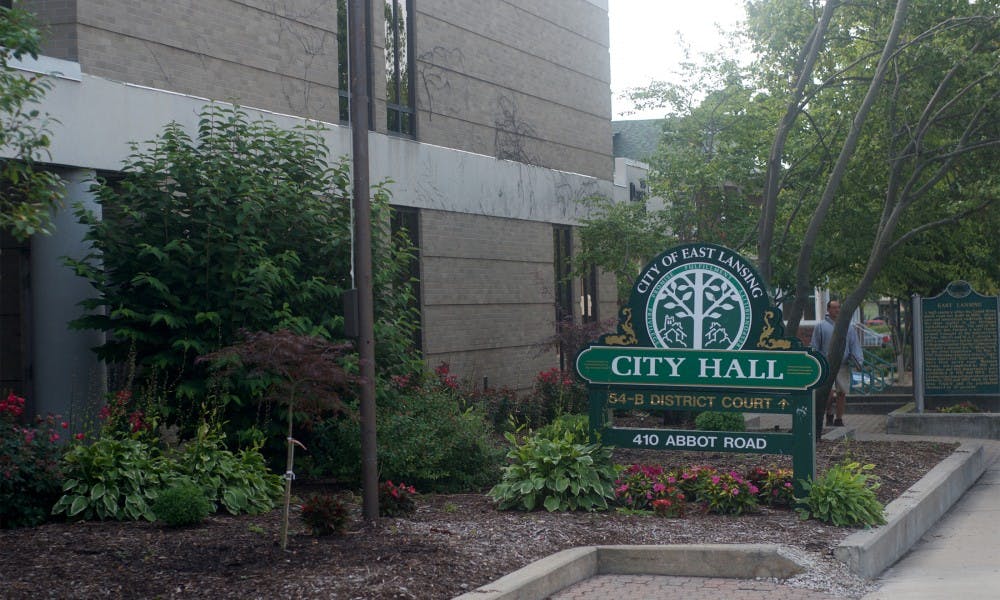East Lansing City Council approved an ordinance purposed to deal with "dangerous buildings" at the Tuesday council meeting.
The ordinance can be used as a "tool" when dealing with abandoned buildings, such as those on the corner of Grand River Avenue and Abbot Road, Mayor Pro Tem Ruth Beier said.
Council also passed a "temporary moratorium," with the purpose of protecting trees in the city.This moratorium may hinder development in the city, councilmember Shanna Draheim said.
The moratorium was also passed at the Dec. 1 city council meeting, which occurred inside city hall and began at 7 p.m.
The dangerous building ordinance was unanimously approved by council.
City Attorney Thomas Yeadon said the ordinance is based off Michigan Supreme Court Case Bonner vs City of Brighton.
The court upheld a provision, in the Bonner vs city of Brighton case, which said if the property would cost more to rehabilitate than it would to demolish it, the city has the ability to order demolition despite any requests of the property owner to reconstruct.
“The buildings are on the corner of Grand River and Abbot, this ordinance says that if they are not worth as much it costs to knock them down then we are allowed to knock them down," Beier said. "I don’t know if we will or not, but if things continue to stall we have an option of just getting some grass there."
Beier said the city will not gain ownership of the property through this ordinance or be able to construct anything on it, but will be able to take steps to make the property "not so dangerous and ugly" with the ordinance.
Beier, Draheim and Mayor Meadows all said they would like to make the point that council did not approve the demolition of the buildings on the corner of Grand River Avenue and Abbot Road and the decision to demolish will not be made without discussion among council members and input from residents..
Beier said discussion regarding demolition of the vacant buildings on the corner of Grand River Avenue and Abbot Road will not occur for "quite a while" as the buildings are in redemption period.
This means the city doesn't know who currently owns the property and who they would notify if the decision was made to demolish the buildings, Beier said.
The "temporary moratorium" regarding protection of trees was passed 3-2 by council with Beier, Meadows and Councilmember Erik Altmann in favor and Draheim and Councilmember Susan Woods opposed.
The moratorium was presented by Altmann and would be in effect until May 1. It directs the City Engineer to not accept or process after Dec. 1, 2015, any
applications for a tree removal or land clearing permit until May 1 or until 30 days after the passing of a city ordinance regarding the subject of the moratorium.
The moratorium came into discussion after council voted unanimously to defer action on an ordinance with the purpose of protecting trees in the city.
Action was deferred until the first meeting in March.
“Councilmember Altmann has raised the concern that while this matter is under investigation that people will cut down trees that might otherwise be protected under the ordinance," Yeadon said while discussing the moratorium.
The ordinance would have added “certain trees within the city deserve to be protected because of their unique and intrinsic value to the general public due to their size, age, historic association or ecological value" to the the code of the city of East Lansing.
Four groups would have been given the ability to ask that a tree becomes protected. The groups would have included property owner on which tree is located, the East Lansing Planning Commission during site plan review, the city engineer and neighborhood associations.
Council would then hold a public hearing to decide whether or not to deem the tree protected based on a few requirements being species of the tree, age, historical significance and ecological value of the tree, but the ordinance did not pass.
Support student media!
Please consider donating to The State News and help fund the future of journalism.
Concerns were raised by property owner Matt Hagan, of Hagan Realty, over the infringement of property owner rights.
Representatives from Consumers Energy and the Lansing Board of Water and Light were also present to express concerns of safety as the ordinance would have hindered the ability to maintain vegetation within the vicinity of or interfering with infrastructure used to provide electricity to residents of East Lansing.
After taking in these concerns and those of other residents, council deferred action on the ordinance and began discussing the moratorium as a placeholder to protect the trees.
“Delaying or putting a moratorium on all tree removal or land clearing until May is incredibly restrictive," Draheim said about the moratorium, which was passed by council. "I think that is a long period of time. While there are a lot of exceptions to that, it is potentially very risky to on-going development of things that are being proposed or conceived at this point.”
Draheim said if such a proposal were to come forward, the developer wouldn't be allowed to proceed with construction and land clearing under the moratorium.
“It potentially puts a halt on things depending on what comes up," Draheim said. "I don’t like to tie our hands.”
Draheim also said she doesn't see the rush to cut down trees that would be protected under the ordinance as a real risk.
Discussion
Share and discuss “City Council approves ordinance to demolish abandoned buildings” on social media.





